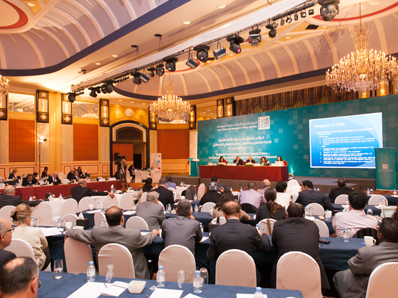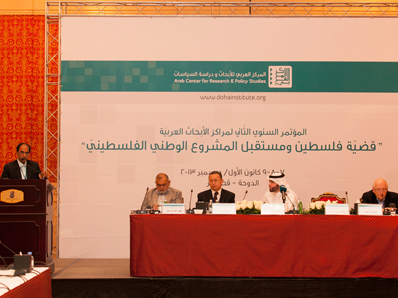 |
| A discussion session in the third day of the Conference |
The Arab Center for Research and Policy Study’s Second Annual Conference on “The Palestinian Cause and the Future of the Palestinian National Movement” concluded on December 9. The three-day gathering of researchers, scholars, politicians, activists, and international solidarity workers issued a frank call for the reformulation of the Palestinian nationhood project in response to the current era’s demands, drawing upon the lessons learned from both resistance and negotiation, as well as upon new approaches derived from international experience such as the South African anti-apartheid movement. Lecturers and speakers during the proceedings determined that any new statehood project could come to fruition only if based upon Palestinian national unity and the creation of a shared reference point around which all Palestinian groups could build consensus, whether this involved a restructured and reformed Palestine Liberation Organization, or an entirely new entity.
Sessions in the final day of the conference were concerned with “Palestine in International Law,” “Refugee Issues,” and “The Palestinian Cause in Foreign Policy”. Lastly, four discussion panels took place: “European Policies toward the Arab-Israeli Conflict,” “The Palestinian Cause in Arab Media and Press,” “Youth Movements in Support of the Palestinian Cause,” and a final discussion panel devoted to Arab research centers.
International Law Will not Liberate Palestine but It Does Embarrass Israel
The first session gave rise to a sober legal discussion linked to Palestine in international law—such as the separation wall, refugees, and settlements—racist discrimination, and crimes against humanity, with contributions from a number of legal experts and international advocates, including former Jordanian member of the International Court of Justice in the Hague, Awn al-Khasawneh’s presence.
In his presentation “The Implications of the Advisory Opinion on the Apartheid Wall: a Practical Vision,” Advocate Mohammed Khalil Moussa summarized the on-going debate surrounding the utility of international courts and attempts to exert pressure upon the Israeli occupation through international law by stating, “international law will never liberate Palestine, but it can strip the legitimacy from many Israeli practices and plans, and re-affirm Palestinian people’s rights.” Palestinian legal expert Diana Buttu focused on a critical point relating to the settlements in her paper “Settlements in International Law,” remarking that the discourse of the Palestinian negotiators has slipped from stating the true demand to remove all settlements, since they are illegal in international law, to simply ceasing settlement activity and the expansion of existing settlements.
Unresolved Refugee Problem Necessitates Granting Them Arab Nationalities with Full Citizenship Rights
Palestinian researcher Abbas Shiblak voiced a demand for Arab states to issue citizenship for all Palestinian refugees residing in their territories since the absence of a nationality deprives them of basic human rights to travel, to work, and more. In the same vein, activist Adam Shapiro voiced a demand for Arab states to accord protection to Palestinian refugees and to uphold their welfare, in addition to regularizing their legal status and ensuring their right to return and political rights. He affirmed that the provision of these rights could only strengthen the dynamism of the Palestinian nationhood project.
Researcher Rami Abu Shehab spoke of the diaspora from the standpoint of discourse analysis, testing the ability of Palestinian discourse in the diaspora to confront, and deconstruct, the discourse of the Jewish diaspora, which built upon the centrality of exile and diaspora to sanctify the establishment of the state of Israel.
Eastern European States Obstructed Application of Pressure upon Israel
In the discussion panel on European Policies toward the Arab-Israeli Conflict, Bishara Khader stated that the European Union had a major influence upon the American stance on the Palestinian issue, and that the EU’s position on the issue had developed in a positive way. However, he also observed that Eastern European states had obstructed any imposition of pressure upon Israel in the wake of the Soviet Union’s collapse “due to their hostility toward Islam and their relations with Israel”. Contradictions among the Eastern European states and their strategic relations with the US played a key role in thwarting any unified and decisive stance regarding the Palestinian question and Israeli aggression.
Marc Otte, director of Policy Planning at the Ministry of Foreign Affairs in Belgium, noted that after the Palestinian legislative elections in 2006, the states of the EU did not wish to boycott the government run by Hamas, but that the Palestinian Authority in Ramallah had requested this boycott; it was not a matter that was in the EU’s hands as the PA acted to “stop the conversation”.
Indian Researcher: Israel Meets Indian Friendly Overtures with Unreasonableness
 Indian researcher and Islamic studies expert Zafarul Islam Khan said that despite the extreme importance that India attaches to its relations with Israel, the Israeli government spares no effort to continuously create problems, with many instances of spying and intrusive behavior. Khan mentioned in his paper on “India and the Palestine Problem,” that India purchases half of the weaponry that Israel produces and that it generally tries to enter into joint ventures with Israel, shouldering the expense. This continuing friendliness toward Israel can be explained by India’s desire to benefit not only from “Israeli military expertise” in combatting what it calls “terrorism,” but also the Israeli lobby in the US, pressuring the country to lift its ban on transfer of high technology to India.
Indian researcher and Islamic studies expert Zafarul Islam Khan said that despite the extreme importance that India attaches to its relations with Israel, the Israeli government spares no effort to continuously create problems, with many instances of spying and intrusive behavior. Khan mentioned in his paper on “India and the Palestine Problem,” that India purchases half of the weaponry that Israel produces and that it generally tries to enter into joint ventures with Israel, shouldering the expense. This continuing friendliness toward Israel can be explained by India’s desire to benefit not only from “Israeli military expertise” in combatting what it calls “terrorism,” but also the Israeli lobby in the US, pressuring the country to lift its ban on transfer of high technology to India.
Despite this, Khan said, Israel repeatedly violates trust and confidentiality with India, with the Indian government discovering many spy cells throughout India, and frequently by-passes the central government “to establish direct links with a number of state governments, on an unprecedented basis”. Israeli tourists, over 40,000 per annum, are known for rowdiness, narcotics smuggling, and cooperating with criminal gangs. Khan expressed his dismay regarding India’s foreign policy with regard to Israel, observing that India, “once a leader of the non-aligned nations during the Cold War,” had developed an orientation that prioritized its economic interests over moral concerns.
Leading Public Figures alongside Activists and Researchers at This Year’s Conference
Qatar’s Emir Tamim Bin Hamad al-Thani was the guest of honor at the official opening ceremony, Moroccan Prime Minister Abdelillah Benkirane appeared as an honored conference guest, and President of the Constituent Assembly of Tunisia Mustapha Ben Jafar addressed a political symposium held during the conference. In addition to these prominent figures, ACRPS hosted a number of politicians from a variety of Arab countries, different public personalities and Arab region diplomats, and journalists. The conference also saw the participation of several Palestinian leaders and political figures from a variety of factions including the PLO Central Committee member and Chief Negotiator Saeb Erekat and Hamas International Relations Head Osama Hamdan.
Alongside expert researchers in issues of the Palestinian cause, young activists and Palestine solidarity workers from all over the world presented at the conference, as did a group of Arab parliamentarians. The conference was the most extensive academic and political event to take up the Palestinian cause in the Arab region in recent years, and a unique Arab world milestone convening more than 70 Arab research, political studies and strategy centers.